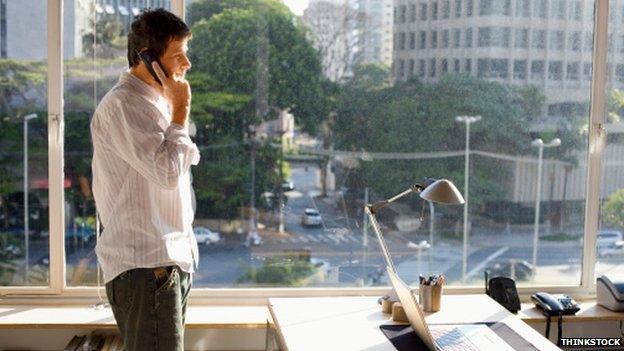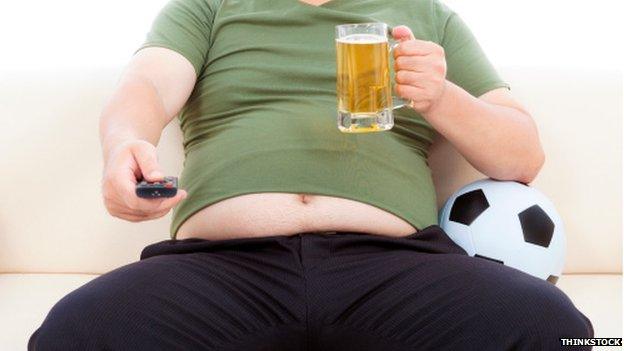Exercise guidelines 'hard to meet'
- Published
- comments

Simple things like standing to take a call 'boosts activity levels'
One of the UK's leading sports medicine specialists says government guidelines are actually discouraging people from being active.
In this week's Scrubbing Up, Dr Mike Loosemore, head of exercise medicine at the Institute of Sport Exercise and Health at University College London who has been involved in the development of commercial exercise programmes, says people should be encouraged to do more "low-level" exercise - such as simply standing up.
Ready for a sit-down or are you sitting comfortably already?
You might be a little less relaxed if you knew that lack of physical activity is the public health problem at the beginning of the 21st century.
There is an overwhelming weight of evidence that humans need to be active.
And I'm not talking about hours in the gym or jogging miles around the local park, but simply avoiding the sort of sedentary behaviour that sees us spending hours of our day sat in front of a computer, at the wheel of car or watching the gogglebox.
It's time to stand up for yourself. Literally.
There is now enormous evidence that simply standing makes huge differences to your health.
It is estimated that being on your feet for just three hours a day can extend your life by two years!
Cure-all?
The great news is of course that now everyone can benefit.
If you are feeling unfit or fat, or too over the hill to walk up even a small one, it's time to think again.
Low-level activity, even regularly getting off your seat, can change your life forever.
Active individuals reduce their risk of heart disease by 40% against their inactive counterparts.
Other reductions are similarly extraordinary. High blood pressure can be lessened by almost 50%, the risk of recurrent breast cancer by almost 50% whilst the likelihood of colon cancer goes down by over 60%.
It has great mental benefits, too, with the risk of developing of Alzheimer's disease decreased by a third and depression eased as effectively as Prozac or behavioural therapy.
Activity is not only more powerful than drugs for most conditions, but can act as a cure-all.
The UK government's recommendation that adults in the UK complete 30 minutes of moderate activity five days a week to achieve the above gains would seem to make sense.
No drugs are involved and this level of activity needs no special equipment.
'Impractical or unobtainable'

This may be a common sight at the moment
It would seem so undemanding yet so beneficial, you would expect the whole of the population to be following these guidelines.
However, what do we find?
When adults were monitored, barely 7% of men and 4% of women were carrying out enough activity to fulfil them.
It is perhaps not surprising that the UK has one of the highest levels of obesity in the world.
So the governments' recommendations are not just failing to encourage the population to increase their physical activity, but are seemingly acting as a positive disincentive to people to participate at all.
For many of the population, 30 minutes of moderate activity is deemed impractical or unobtainable, so the idea that being more physical to improve long-term health is ignored or dismissed.
Most of us do not have the time, energy or inclination to make the effort, so the recommendations are not just failing to engage the population, but are positively discouraging people to participate at all.
But there is some good news.
Even a small amount of activity can make major health gains, and this is what the population really needs to be taught.
Every action, even a single step on a stair or standing up for a few seconds, can put you on a positive path to better health.
If you start to think that the smallest movement makes a significant difference, then every single person can take part and gain the powerful benefits of being physically active.
As you can see, feeling great is a walk in the park.
Dr Mike Loosemore is Head of Exercise Medicine at the Institute of Sport Exercise and Health, University College Hospital, London. He was chief medical officer for England at the 2014 Commonwealth games and is co-designer of Active Movement, a low-level activity programme for workplaces.